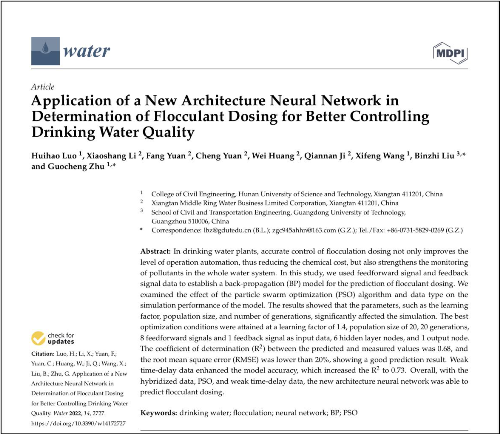Recently, the research results of the R&D team on the project of construction of flocculation and concentration network in water purification system of waterworks of the Xiangtan branch of General Water of China Co.,Ltd, an academic paper entitled "Application of a New Architecture Neural Network in Determination of Flocculant Dosing for Better Controlling Drinking Water Quality" was officially published in the Swiss journal Water (impact factor 3.530). Another academic paper of this team entitled “Developing Flocculation Tensor to Monitor Water Quality Using Deep Learning Model” will soon be published in Environmental Chemistry Letters, Germany (impact factor 13.615). The two papers will be incorporated into the SCI database.

The above-mentioned R&D project is led by Dr Yuan Fang from General Water of China Co.,Ltd as a sub-project of a major scientific and technological innovation project titled “A Research on the Overall Process Scheme of Intelligent Waterworks”. It is jointly developed and researched by General Water of China Co.,Ltd in Xiangtan and Hunan University of Science and Technology.
With increasingly refined requirements for operation and management of drinking water plants, on the basis of ensuring the improvement of water quantity and quality, it has become a hot research topic to tap the potential role of a large amount of data in operation system to achieve the goals of energy saving and consumption reduction, quality improvement and efficiency improvement in production and operation. Automatic coagulation control is the key to normal production and cost control of chemicals in water-making enterprises. However, there are a series of problems in automatic dosing in domestic water plants, such as high drug consumption, poor economic benefits, unstable water quality and high labor intensity. The above-mentioned research results can accurately predict the dosage of flocculants by constructing a new neural network model, which will complete the scientific and accurate dosing tasks, and achieve the goal of water treatment efficiency. The neural network model can improve the accuracy of flocculation dosing, reduce the labor intensity and operating cost, and provide reliable technical support for the automation of the enterprise to a higher level. It provides a new method for studying the development and application of basic data of flocculation dosing control. The above-mentioned research results provide a new scientific basis for strengthening the monitoring, analysis and control of pollutants in the water-making system.